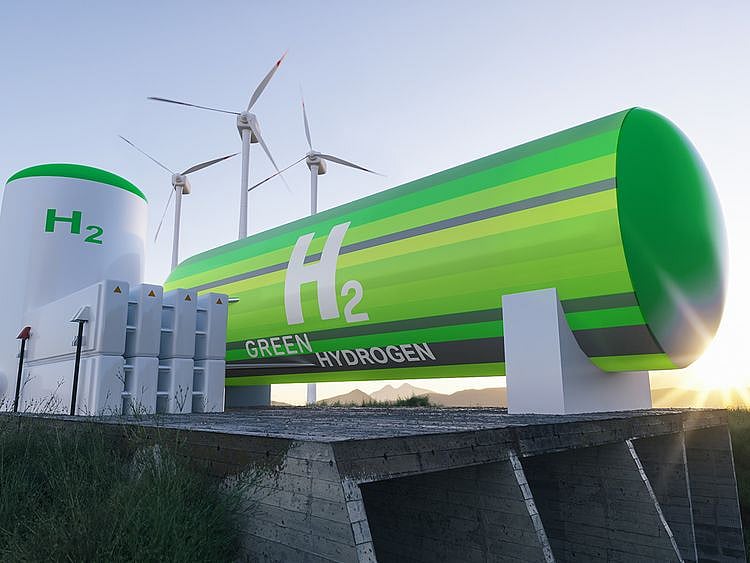Meeting climate pledges requires more decisive action
The UAE government is taking great strides in developing a robust green hydrogen industry

You might hear “energy of the future” a lot when hydrogen is the topic of discussion. It has been marketed as a reliable, versatile, and clean source of energy that offers a solution to the climate crisis.
That is true in the case of green hydrogen that is produced using renewable energy and is completely emission-free. However, green hydrogen is hugely energy intensive and too expensive right now to be commercially feasible, so most of the hydrogen currently being produced is blue, which is two to three times cheaper.
The distinction between the two is substantial. While blue hydrogen doesn’t produce any emissions when burnt, the process of its production is far from clean. Blue hydrogen is extracted from natural gas in a process that requires a lot of energy and emits vast amounts of carbon dioxide.
Also Read
World Humanitarian Day: UAE a role model in integrating climate action with humanitarian workHow the UAE is playing a proactive role in climate actionWhy methane reduction should dominate COP28While the plan is to capture and store the gas underground, there are concerns as to what to do with the stored supply of gas in the future, and whether this solution has a long-term viability. The assumption that the captured carbon dioxide can be stored indefinitely is both optimistic and unproven.
Moreover, producing natural gas releases methane, a particularly potent greenhouse gas that can warm the air 86 times more than carbon dioxide in just 20 years. Inevitable leaks of methane happen during drilling, extraction, and transportation.
According to the Global Hydrogen Review 2021, released by the International Energy Agency (IEA), the demand for hydrogen stood at 90 Mt in 2020, produced almost exclusively from fossil fuels, resulting in close to 900 Mt of CO2 emissions.
Fugitive methane emissions
Considering both the uncaptured carbon dioxide and the large emissions of unburnt fugitive methane emissions, scientists have concluded that the carbon footprint to create blue hydrogen is more than 20 per cent greater than using either natural gas or coal directly for heat, or about 60 per cent greater than using diesel oil for heat.
With those shocking figures, calling hydrogen, as it is produced today, a low-emission fuel, let alone a zero-emission fuel, is far from the truth.
IEA urges governments to take rapid, more decisive actions to lower the barriers that are holding green hydrogen back from faster growth, which will be important if the world is to have a chance of reaching net zero emissions by 2050.
Green hydrogen technology
In the UAE, the government is taking great strides in developing a robust green hydrogen industry. We have the natural resources, technological expertise, and the political will needed to become a key player in the global green hydrogen supply chain.
The green hydrogen technology is still nascent and has a long way to go to get where it needs to be to help the world reach net zero emissions by 2050.
Some might argue that until commercial-scale green hydrogen production is successfully deployed and becomes cost-competitive, blue hydrogen offers a bridging technology that can be used to support the transition to a decarbonised energy system.
“Halfway solution”
I believe this is a way to give a “green” cover to those who are stalling and unwilling to take real steps towards climate action. This is what I would call a “halfway solution”.
We don’t have time for halfway solutions. The climate crisis is already in motion, driving people out of their homes in vulnerable countries and causing massive loss in our precious biodiversity. Every year, climate change aggravates the frequency, intensity, and duration of natural disasters that are destroying people’s lives and livelihoods.
We are in a race against time. Unless we go on that race with a firm resolve to win, we will lose. There is much at stake here, and the future generations will have to face the consequences and pay for our slackness.
Meeting climate pledges requires faster and more decisive action. As we welcome the new year, let’s show real commitment to building the climate-safe future that the young generation is demanding and not settle for halfway solutions.
Dr Abdullah Belhaif Al Nuaimi is the former UAE minister for climate change
Sign up for the Daily Briefing
Get the latest news and updates straight to your inbox
Network Links
GN StoreDownload our app
© Al Nisr Publishing LLC 2026. All rights reserved.